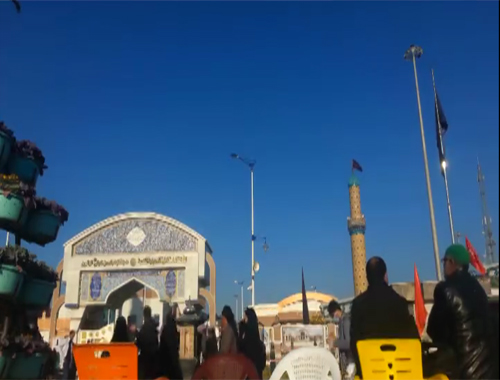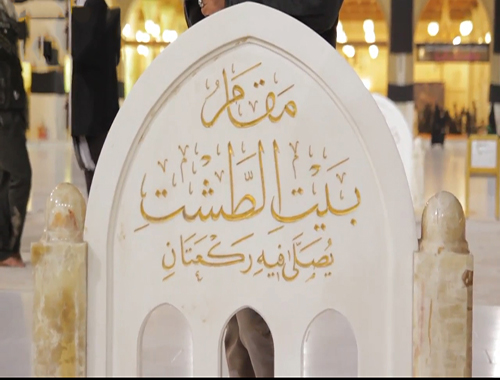Detailed Answer
- Details
- Hits: 2293
Detailed Answer
The slave is indebted to Allah (awj) for not only all of his perfections, but indeed for his very existence. It is because of this that he submits to Him. By not looking at himself and his own desires, he takes on the colour of his Master and His perfections to the extent that according to the saying of the Noble Prophet (ص), “The true slave of Allah Almighty is he for whom the obedience and love of Allah becomes sweet. He presents his needs to his Lord and becomes intimate with Him. He puts all his trust in Him and has hope in no one else.”[61]
According to the saying of Imam Ja’far b. Muhammad as-Sadiq (ع), the reality of slavery is in three thing, the first is the fact that “The slave does not think that he owns anything that Allah has given him. This is because slaves do not own anything for themselves. They consider all their wealth to belong to Allah. They place whatever they have wherever Allah tells them to. The second is the fact that the slave of Allah does not weigh what is good and bad for himself. Thirdly, he spends all his activity in that which Allah had commanded him to do, and does not do what He has forbidden him from. Because he does not consider himself to own what Allah (awj) has given him, giving it away is easy for Him. Since the slave of Allah (awj) has relegated his affairs to Allah (awj), the problems of the world become easy for him. And since he spends all his time doing what Allah (awj) has told him to do or staying away from what he has been prohibited from; he has no time left to be ostentatious. Thus, Allah (awj) honours His slave by means of these three things and by means of this, his response to Satan’s challenges and his interaction with the other creatures of Allah (awj) becomes easy. He does not go after the world in order to hoard wealth or show off in front of people. He does not seek any wealth and power that he sees in the hands of others, nor does he spend his days in vain pursuits.”[62]
Slavery is the key to sanctity. The title “slave” is the best of titles and it is because of this that the name of the Prophet (ص) was ‘Abdullah and on the night of ascension he asked Allah (awj) to grant him servanthood.
The perfect man is the servant of Allah. He has all the manifestations of Divine Names. He is effaced in the Divine Essence.
The lexicographers have defined worship as the pinnacle of humility. They have said that since worship is the highest level of humility, it does not befit anyone other than one who holds the highest levels of existence, perfection, grace, and generosity. Because of this, the worship of other than Allah (awj) is false worship that is tantamount to polytheism.
Worship has three levels: Some people worship Allah (awj) with the hope of getting other worldly rewards or because they fear His punishment[63] - these are the ordinary believers; some worship Allah in order to gain the honour of servanthood and so that Allah (awj) calls them His slave; some however, worship Allah (awj) because they are in awe of His Might and because they love Him.
It has been related in a sacred tradition that Allah (awj) said, “Oh my slave! Worship me so that I make you like Myself. I say to something, ‘Be,’ and it is, you will also say to something ‘be’ and it will become so.”[64]
Therefore, according to a saying of Imam Ja’far b. Muhammad as-Sadiq (ع), “Servanthood is a substance, the kernel of which is Lordship.”[65]
By means of worship, man’s soul becomes like a polished mirror in which the Divine lights are reflected. The more it is polished the more will it reflect the flashes of Divine illumination; until such a time that his potential for sanctity will change to actuality and he will become the vicegerent of Allah (awj) in the whole realm of existence. You should know that this is not lordship but it is a vicegerency and a representation in which the effects of lordship become manifested. The vicegerent of Allah (awj) does not do the work Allah (awj) does. Allah (awj) rather accomplishes his work at the hands of His vicegerent. Through the lattice of the soul of this person, He manifests Himself and reveals His Names and Attributes. Because of this the divine Gnostic is the perfect mirror for the power and grace of Allah (awj).
In all the types and degrees of the miracles of the prophets and the Imams (ع), in reality, it is Allah (awj) who is the absolute agent while the soul of the saint has been effaced in His will. This is the station of servanthood - a station that can be obtained by means of obeying Allah (awj).
The spiritual wayfarer considers himself to be the name of Allah (awj) in this station, to be effaced in Allah (awj) as he recognizes other beings to be the same. If he be a perfect saint, he will become the perfect name of Allah (awj) and apply in himself perfect and absolute servanthood.
In the Noble Qur`an, Allah (awj) says,
“Glory be to He who took his servant on the night journey.”[66]
This indicates the fact that travelling the path to Allah’s (awj) nearness can only be achieved by means of servitude. One must forego the pride and haughtiness that comes with presumptions of independence.
In the tashahhud first we give witness to the Prophet’s servanthood, then to his prophethood. This is because servanthood is the ladder by means of which he ascended to the station of prophethood. In the Salat, which is the night ascension of the believer, we start with the “bismillah” that is the reality of servanthood.
Intention, according to the general public, means the desire to obey Allah (awj) whether that be out of greed or fear. “They call on their Lord, greedily and out of fear.” According to those with wisdom it is the desire to worship Allah (awj) out of respect and in order to acknowledge his greatness. “Worship Allah as if you were seeing Him. If you are not seeing Him, verily, He sees you.” According to those with the love of Allah (awj), it is the desire to obey Allah (awj) out of love for His essence. Finally, near the Friends of Allah (awj) it means to intend to obey Him and worship Him as an effect of witnessing the beauty of the Beloved, independently and essentially, and to be annihilated in the Lord, essentially, in His attributes and in His actions. One of the most important conditions of intention is sincerity.
Sincerityof intention, in the general public’s worship, is purifying one’s intention of both patent and hidden polytheism, which include such traits as ostentation, self-conceit, and pride.
“Now, surely, sincere obedience is due to Allah.”[67]
In the worship of The High-ranking, however, it is to purify one’s intention from any trace of greed or fear which in their mode of wayfaring is considered polytheism. In the worship of The Possessors of Heart (ashab al-qulub), it is to purify one’s intentions from egoism which is the greatest polytheism and disbelief in their mode. In the worship of The Most Perfect, it is purifying one’s intention of noticing the station of servitude and the act of worship, and further yet noticing the existence. As Imam Khomeini said, “The healthy heart is the one which meets The Truth, without anything else disturbing their intimacy.”[68]
Notes:
[60] Misbah al-Shari’ah,chapter 2:
ÙˆÙŽØÙرÙÙˆÙ٠الْعَبْد٠ثَلاَثَةٌ ( ع ب د ) Ùَالْعَيْن٠عÙلْمÙه٠بÙاللٌّه٠وَالْبَاء٠بَوْنÙه٠عَمَّنْ سÙوَاه٠وَالدَّال٠دÙÙ†ÙوّÙÙ‡Ù Ù„Ùلٌّه٠تَعَالـى بÙلاَ كَيْÙ٠وَلاَ ØÙجَابÙ.
[61] Arba’in
[62] Bihar al-Anwar, vol. 1, pg. 224, no. 17:
أَنْ لاَ يَرَى الْعَبْد٠لÙÙ†ÙŽÙْسÙÙ‡Ù ÙÙيمَا خَوَّلَه٠اللٌّه٠مÙلْكاً Ù„Ùأَنَّ الْعَبÙيدَ لاَ ÙŠÙŽÙƒÙون٠لَهÙمْ Ù…Ùلْكٌ يَرَوْنَ الْمَالَ مَالَ اللٌّه٠يَضَعÙونَه٠Øَيْث٠أَمَرَهÙم٠اللٌّه٠بÙÙ‡Ù ÙˆÙŽ لاَ ÙŠÙدَبّÙر٠الْعَبْد٠لÙÙ†ÙŽÙْسÙه٠تَدْبÙيراً ÙˆÙŽ جÙمْلَة٠اشْتÙغَالÙÙ‡Ù ÙÙيمَا أَمَرَه٠تَعَالَى بÙÙ‡Ù ÙˆÙŽ نَهَاه٠عَنْه٠ÙÙŽØ¥Ùذَا لَمْ يَرَ الْعَبْد٠لÙÙ†ÙŽÙْسÙÙ‡Ù ÙÙيمَا خَوَّلَه٠اللٌّه٠تَعَالَى Ù…Ùلْكاً هَانَ عَلَيْه٠الإÙÙنْÙَاق٠ÙÙيمَا أَمَرَه٠اللٌّه٠تَعَالَى أَنْ ÙŠÙنْÙÙÙ‚ÙŽ ÙÙيه٠وَ Ø¥Ùذَا Ùَوَّضَ الْعَبْد٠تَدْبÙيرَ Ù†ÙŽÙْسÙه٠عَلَى Ù…ÙدَبّÙرÙه٠هَانَ عَلَيْه٠مَصَائÙب٠الدّÙنْيَا ÙˆÙŽ Ø¥Ùذَا اشْتَغَلَ الْعَبْد٠بÙمَا أَمَرَه٠اللٌّه٠تَعَالَى ÙˆÙŽ نَهَاه٠لاَ يَتَÙَرَّغ٠مÙنْهÙمَا Ø¥ÙÙ„ÙŽÙ‰ الْمÙرَاء٠وَ الْمÙبَاهَاة٠مَعَ النَّاس٠ÙÙŽØ¥Ùذَا أَكْرَمَ اللٌّه٠الْعَبْدَ بÙÙ‡ÙŽØ°Ùه٠الثَّلاَثَة٠هَانَ عَلَيْه٠الدّÙنْيَا ÙˆÙŽ Ø¥ÙبْلÙيس٠وَ الْخَلْق٠وَ لاَ يَطْلÙب٠الدّÙنْيَا تَكَاثÙراً ÙˆÙŽ تَÙَاخÙراً ÙˆÙŽ لاَ يَطْلÙب٠مَا عÙنْدَ النَّاس٠عÙزّاً ÙˆÙŽ عÙÙ„Ùوّاً ÙˆÙŽ لاَ يَدَع٠أَيَّامَه٠بَاطÙلاً.
[63] Nahjul Balaghah, Short saying 237; al-Kafi, vol. 2, pg. 84, no. 5:
عَنْ أَبÙÙŠ عَبْد٠اللٌّه٠( ع) قَالَ: اَلْعÙبَاد٠ثَلاَثَة٠قَوْمٌ عَبَدÙوا اللٌّهَ عَزَّ وَجَلَّ خَوْÙاً ÙَتÙلْكَ عÙبَادَة٠الْعَبÙيد٠وَقَوْمٌ عَبَدÙوا اللٌّهَ تَبَارَكَ وَتَعَالـى طَلَبَ الثَّوَاب٠ÙَتÙلْكَ عÙبَادَة٠الأَجْرَاء٠وَقَوْمٌ عَبَدÙوا اللٌّهَ عَزَّ وَجَلَّ ØÙبًّا Ù„ÙŽÙ‡Ù ÙَتÙلْكَ عÙبَادَة٠الأَØْرَار٠وَهÙÙŠÙŽ Ø£ÙŽÙْضَل٠الْعÙبَادَةَ.
[64] Kalimatollah, pg. 140, no.154:
عَبْدÙÙŠ Ø£ÙŽØ·ÙعْنÙÙŠ Øَتَّى أَجْعَلَكَ Ù…ÙثْلÙÙŠ Ø£ÙŽÙ‚Ùول٠لÙلشَيْء٠كÙنْ ÙÙŽÙŠÙŽÙƒÙونَ تَقÙولَ Ù„Ùلشَيْء٠كÙنْ ÙÙŽÙŠÙŽÙƒÙونَ.
[65] Misbah al-Shari’ah,chapter 2:
أَلْعÙبَادَة٠جَوْهَرَةٌ Ú©ÙنْهÙهَا الرّÙبÙوبÙيَّةÙ...
[66]Surat al-Isra’ (17), Verse 1:
} سÙبْØَانَ الَّذÙÙŠ أَسْرَى بÙعَبْدÙÙ‡Ù... {
[67] Surat al-Zumar (39), Verse 3:
} أَلاَ Ù„Ùلٌّه٠الدّÙيْن٠الْخَالÙص٠{
[68]Sirr al-Salat, pg. 75 (Farsi Version)











